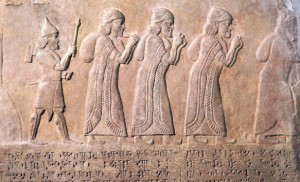What is your driving question?
I participate in a book study at Broadway UMC. Right now we are working through a called Simply Christian by NT Wright (who happens to be one of the scholars I most look up to).
This past week the topic was supposed to be the Character of God and the story of Israel. It surprised no one when we got a bit off subject and began talking about “souls” and what the main point of Christianity was. When it comes to the soul I am a monist with reservations and thus don’t believe in a soul as traditionally defined — I reject the dualism of the whole proposition; I find thinking of the body as something separate from the soul leads to an unhealthy anthropology as we either see the flesh (and therefore the world) as bad or inconsequential.
That was a bombshell for some. However it led to a good discussion on the philosophical development of the idea of the soul. For the most part, writers in the Old Testament did not conceive of a soul. Where the word does appear (nephish) it is referring more generally to “the self.” Furthermore, the concept of an afterlife is virtually non-existent until the post-exilic age. By the time of the second temple and the ministry of Jesus, the soul and the afterlife were firmly developed in Religious discussion.
So, that leads one to wonder, “What caused this change?” Well the answer is relatively simply. In the patriarchal (Abraham-Moses) era through the Monarchy (David, Solomon, and then all those chaps whose names you skim over when reading), the people of God saw all their needs fulfilled in YHWH in their day to day life (granted they did not always act like it). They had YHWH’s presence with them; they had been given the promised land; and their identity was firmly established. There was no need to ask questions about what happens when you die because they saw fulfillment in their current situation. For them, the primary question was “What does it look like to be the people of God.” The answer to that is simple and contained in the promise to Abraham: “You will be blessed so that you can cause the blessing of all nations.” From there, the laws and customs evolved to help flesh that out.
Things change once exile comes. After the sins of the divided kingdoms, YHWH turns to the Assyrians and the Babylonians to be his instrument of judgment. Simply put, Israel was not living up to their calling and the Presence, Land and Identity were stripped of them. Before YHWH dwelt in their temple, now they were captives and YHWH presence seemed so distant. They lamented: “By the rivers of Babylon we sat and wept when we remembered Zion… How can we sing the songs of the LORD while in a foreign land?” Their daily lives did not exhibit the hope they once had.
At this point, hopefully you are connecting the dots. The concept of a soul and of the afterlife developed because the people of Israel had lost their identity and primary calling. It no longer made sense to envision God’s will being played out in their day to day lives. Their hope instead had to lie in the “by-and-by.”
The early Jews were driven by the question: What does it mean in this day to be the people of God? This included issues of identity, blessing and duty. For exilic and post-exilic Jews, the question evolved: What will it mean to be the people of God?
It is interesting these questions still dominate today. To oversimplify, liberals/emergents tend to ask the first question while evangelicals/fundementalists ask the second question. It is easy to find ourselves in one camp or the other. One may say, “I am better because I realize the presence of God here and now” and the other may “I am better because I care about things that eternal.”
Of course the correct answer is that both questions are valid and equally important. We must understand what it means to be the people of God in this world, and live in eager expectation and preparation for the world that is to come. Without doubt, the ministry of Jesus brought together these questions and he provided the ultimate answer for each in these: He lived the perfect life of reconciliation and restoration, while providing mediation and direction for the life to come.
The real power is actually not found in asking these questions side by side or together. Rather, I am convinced we should simplify our question back to original roots: What does it mean to be the people of God. This question involves Identity, lifestyle (holiness) and hope. It is rooted in an understanding that we are blessed in order to cause the blessing of all the nations. Christians must first understand themselves as the people of God and with that identity they can begin to ask “How should the people of God live in this present world” all-the-while experiencing the hope and reassurance of the world that is to come.
There were a thousand tangents I wanted to take with this post (community vs. idividual understanding of Christianity; Hebrew parsing of Abraham’s calling; heaven, hell, sheol, souls and nephish, etc.) but for now I will be content not making my primary question revolve around my present actions or my future destination, but rather about my identity and implications it brings.
